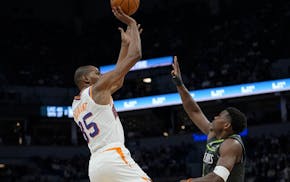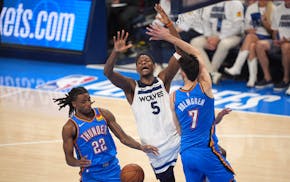SAITAMA, Japan — Apex predators don't usually spend much time wrestling with self-doubt, but the U.S. women's soccer team had to search for mantras and confidence after getting pummeled by Sweden in its first game of the Olympics.
If there were a drive-through window for sports psychology, they would have rented cars.
Saturday night in Tokyo, the U.S. bounced back from that 3-0 loss to Sweden with a 6-1 victory over New Zealand at Saitama Stadium, as First Lady Jill Biden watched from the otherwise empty stands. The U.S. had four goals erased by offside calls in the first half yet dominated play, meaning that a draw or victory over Australia will advance the Americans to the quarterfinals.
They fell in the quarterfinals in Rio in 2016, losing to Sweden and failing to win Olympic gold for the first time since 2000. In the runup to the New Zealand game, the Americans adopted a new mantra.
"Ruthless," veteran Carli Lloyd said. "We have to be ruthless. Ruthless, mentality, heart, fight — those are the words we needed to hear.''
Those were the words coach Vlatko Andonovski offered in the wake of the loss to Sweden, which broke a 44-match unbeaten streak.
The women's soccer team isn't the only apex predator from the U.S. with reason to look for inspiration during the early days of the Tokyo Olympics. The men's basketball team has won gold in the past three Olympics and six of the past seven but this year, for the first time since 1992, lost consecutive pre-Olympic exhibitions, to Nigeria and Australia.
The women's soccer and men's basketball teams share concerns but not root problems. The women may have lost to Sweden because their coach is new and their players are not. The men are simply missing key players and attributes — most notably facilitators and big men.
The women used six players 32 or older on Saturday (their three starters up front averaged 36 years of age), and while that age didn't show against New Zealand, it may have been telling against the younger, faster Swedes.
It's hard for a team like the USNWT to transition from household names as they grow their sport, but it was notable that early on against New Zealand, Rose Lavelle, at 26, was easily the United States' best and most active player. She also scored their first goal, at a point in the game when New Zealand was threatening just as often as the U.S.
For the men's basketball team, scoring will not be a problem, not with Kevin Durant and Damian Lillard dominating the offense. But who will set up teammates, and who will defend the paint?
LeBron James is the ideal superteam teammate, because of his willingness to pass and ability to play any position, and he's not here. Lakers teammate Anthony Davis would give the U.S. a dominant inside presence, and he's recovering from injury.
In the loss to Nigeria, the Americans didn't seem to know how to run their offense yet. In the loss to Australia, they were shredded by big men backcutting or rolling to the hoop and finding no resistance.
After the loss to Nigeria, U.S. coach Gregg Popovich said, "I'm kind of glad it happened.'' After the loss to Australia, he argued with a reporter who stated that the U.S. used to win similar games by blowouts.
The women's soccer and men's basketball teams have at least one thing in common: Both are facing increasing international competition, largely because their players' stardom popularized their sports.
Popovich has to hope that more practice time and cohesiveness — and perhaps the arrival of three players who were busy with the NBA Finals — could change the way his team plays. The U.S. opens against France on Sunday.
Andonovski changed five starters on Saturday, although some of the moves were made because of injuries or to keep his players fresh for the rapid-fire schedule.
Lindsey Horan scored on in her 100th appearance for the national team, and then she and her teammates waved to Dr. Biden after the game ended.
"That was a little surreal," Horan said. "It was nice to have a fan in the stands, too.''

Souhan: Anxiety and depression in the NFL helped inspire Lindsey Young's children's book
Souhan: For Lynx star Napheesa Collier, 'Phee' is just fine

Souhan: Will the Wolves trade for Kevin Durant? Should they?

Souhan: If Edwards is a franchise player, he needs to act and play like it


